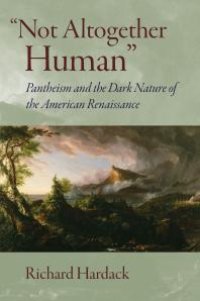
Ebook: Not Altogether Human : Pantheism and the Dark Nature of the American Renaissance
Author: Richard Hardack
- Tags: American literature--19th century--History and criticism.
- Year: 2012
- Publisher: University of Massachusetts Press
- City: Amherst, United States
- Edition: 1
- Language: English
- pdf
Many leading American thinkers in the nineteenth century, who accepted the premises of Emersonian transcendentalism, valued the basic concept of pantheism: that God inheres in nature and in all things, and that a person could achieve a sense of belonging she or he lacked in society by seeking a oneness with all of nature. As Richard Hardack shows, however, writers such as Ralph Waldo Emerson, Nathaniel Hawthorne, and Herman Melville conceived of nature as everything "Other"--other than the white male Protestant culture of which they were a part. This conception of nature, then, became racialized, and the divine became associated with African American and Native American identities, as well as with femininity. In "Not Altogether Human," Hardack reevaluates transcendentalism in the context of nineteenth-century concerns about individual and national racial identity. Elucidating the influence of pantheism, Hardack draws on an array of canonical and unfamiliar materials to remap the boundaries of what has long been viewed as white male transcendental discourse. This book significantly revises notions of what transcendentalism and pantheism mean and how they relate to each other. Hardack's close analysis of pantheism and its influence on major works and lesser known writing of the nineteenth century opens up a new perspective on American culture during this key moment in the country's history.
Download the book Not Altogether Human : Pantheism and the Dark Nature of the American Renaissance for free or read online
Continue reading on any device:

Last viewed books
Related books
{related-news}
Comments (0)